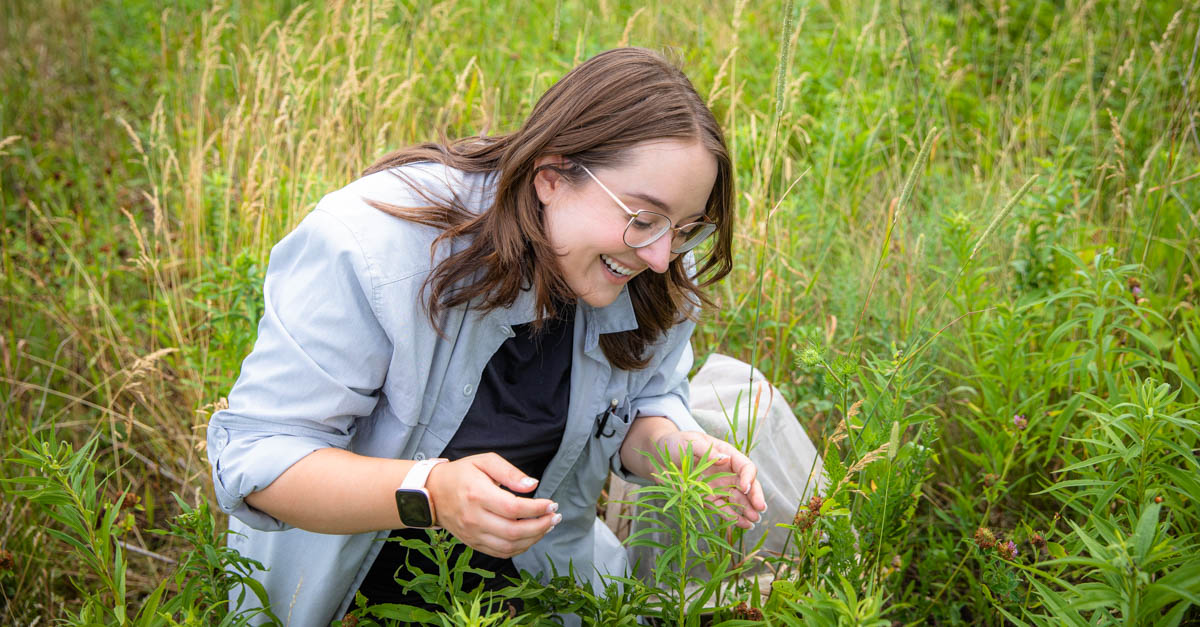Aleksandra Dolezal

Program
Why I Chose Guelph…
Due to the scholarships and the many opportunities the University of Guelph has provided me with during my MSc, I could think of no better place my skills and career goals align with better than at the University of Guelph. Further, the research project I completed with Andrew MacDougall involvesdthe extensive farm network (ALUS) with which he and others in the the College of Biological Science have strong ties.
How did you get to be a PhD candidate at Guelph?
I started out as a pastry chef and worked in the culinary industry for several years but molecular gastronomy got me excited about science and chemistry. I found my love for insect ecology in my undergraduate degree at the University of Toronto and have not strayed from that path since. I worked at the ROM as assistant to the entomology curator during my time at U of T. I completed an MSc project under Andrew Macdougall at U of G and continued in his lab for my PhD.
About My Advisor…
My advisor is a mentor and motivator to me. Since I completed my MSc in his lab he knew more of my strengths and weaknesses and continued to help shape and advise me to making good research choices and career goals. For example, he connected me with "BugNet" which is a collaborative global research network studying global change drivers on insect communities. With his connection, I had a paper in the works with this network and presented findings at the ICECOL2022 conference in Geneva, Switzerland as well as the University of Bern.
About the work you are doing here…
My research tested plant-animal interactions in agroecosystems, targeting the regional and local forces, including human influences that determine arthropod communities' distribution, assembly, and function. My work was interdisciplinary, merging theory and application from ecological and socioeconomic realms, including significant farmer outreach.
How Will Your Research Improve Life?
My PhD Chapter 2 focused on predator-prey interactions, testing predatory spiders' diet in farms with terrestrial (crop) and aquatic systems (wetlands). Restored semi-natural habitats in agricultural landscapes will undoubtedly change these food web dynamics. I highlighted the potential value that natural areas (wetlands) have on trophic interactions that positively impact agroecosystems–such as increased resiliency, biocontrol, or resource stability through time. This chapter tested whether spiders are effective biocontrol agents and whether their diet changes seasonally or spatially depending on which habitat type is present. This project included cutting-edge research on the spider predator diet collaborating with the Biodiversity Institute of Ontario (BIO). The future of food is changing, and I want to be apart of that change.
During my MSc at the University of Guelph I had experience with field surveys in agroecosystems, experience with significant farmer outreach, and even some experience with policy makers. From all these experiences, I have come to better understand the many viewpoints and where knowledge is lacking or is not well connected. I think the University of Guelph has made great strides in addressing these issues by creating the Food from Thought research program that I was heavily involved with. The goal of this program is to develop innovative solutions that improve both the sustainability and productivity of agricultural production at global, landscape, and micro scales. This program also brings together people from different disciplines and agro-food sectors to create better knowledge transmission.
What is it like to be a grad student at Guelph?
We get a lot of opportunities but sometimes we need to search for them. I often took moments to explain the process of scholarships and awards to new grad students coming into the department because there is sometimes no advertisement of them. The past few years Integrative Bio has done a better job of talking about those and helping students with those needs. Grad school can be tough because life in Guelph can be expensive. Take advantage of all the awards and events U of G has to offer!
I love all the greenspace our campus has. Walking in the Arboretum Centre or going to sit in the greenhouse by the UC have been nice de-stressors. Guelph is an awesome city to live in. We have good music festivals, great food, and even better people. The city is full of student events which are often free.
What are your future plans?
My ultimate career goal is to be a museum curator of entomology. I really love scientific communication and take every opportunity to practice this skill. The many graduate conferences at U of G or the Food from Thought research workshops have been a tremendous help in the past. I was also an organizer of Guelph Bug Days to bring my knowledge of insects to the community of Guelph.